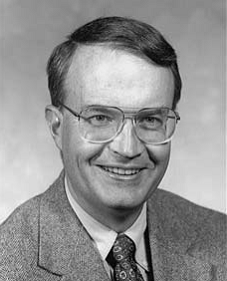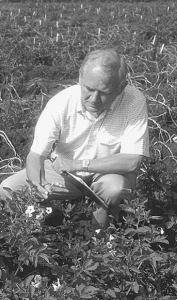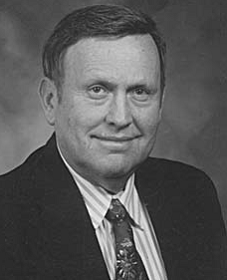2007 Honorary Life Member Selections
 DR. WALTER R. STEVENSON
DR. WALTER R. STEVENSON
Walter R. Stevenson, born in 1946, was raised in the Finger Lakes region of New York State. He received his BS degree in 1968 from Cornell University and his PhD degree in 1972 in plant pathology from the University of Wisconsin-Madison. He began his professional career in extension plant pathology as a faculty member at Purdue University in 1972. In 1979, he returned to Wisconsin where he was appointed as vegetable pathologist (40% research; 60% extension). For the past 28 years his research and extension work covered a wide array of crops including potato, snap beans, peas, carrots, onions and mint, developing comprehensive disease management programs for these crops. Among Walt’s many accomplishments is the development of a forecasting model for the early blight disease of potato. The combination of this model with refined models for late blight forecasting and crop management models contributed by other members of the UW extension potato and vegetable team led to the release of a succession of software packages for grower and IPM consultant use that included “Potato Disease Management”, “Potato Crop Management” and “Wisdom” software. The Wisdom software has been used extensively in Wisconsin and shared with growers throughout the world to improve the management of potato foliar diseases. Due in large part to these efforts by the UW Extension team and adoption of innovative practices by the Wisconsin potato industry, the state is an acknowledged innovator and leader in the grower adoption of IPM practices and in practices that reduce pesticide use in potato and vegetable crops. These team efforts were recognized by the World Wildlife Fund and EPA leading to the development of the award-winning “Healthy Grown” program and the setting of industry standards for pesticide use as well as thresholds for pesticide toxicity and adoption of IPM practices. Dr. Stevenson is also a noted international authority on the use of fungicides for disease control. His research contributed to numerous emergency and local fungicide labels, Experimental Use Permits and the early national registration of important disease management tools for potato and vegetable crops.
Walt is recognized and admired by growers as a responsive and trustworthy friend and valued resource to help them with production problems. In his almost daily, one-on-one contacts, and in some 50 meetings per year, he helped to change the way growers approach the management of potato seedpiece decay, foliar diseases affecting potato and carrot, and white mold on a wide range of crops. He advised 15 MS and PhD students in plant pathology and served on an additional 25 graduate student advisory committees. Walt also served on and advised numerous committees with the Wisconsin Potato and Vegetable Growers Association, Midwest Food Processors Association, Wisconsin Muck Growers’ Association, Wisconsin Mint Board and other industry groups. During the course of his career he made over 1,500 presentations at over 1,200 meetings attended by close to 100,000 growers and industry representatives. He published over 235 peer reviewed scientific articles and abstracts, 320 extension bulletins and proceedings articles, 6 book chapters, weekly grower newsletters during each growing season to the potato and vegetable industry for the past 35 years and over 75 monthly articles for the “Badger Common’ Tater” magazine. He was the lead member of the editorial team that compiled the second edition of the “Potato Disease Compendium” for the American Phytopathological Society and is a member of the steering committee for the second edition of the APS “Potato Health Management” book.
During the course of his career, Walt has shared his experience and information beyond the borders of Wisconsin. He has given invited talks in over 17 states, most of the Canadian provinces and numerous countries including England, France, Mexico, New Zealand, Australia, Taiwan, Portugal, Israel, The Netherlands, Thailand and Serbia. Walt received many awards over his career including The National Potato Council’s Distinguished Service Award in 1992 and Meritorious Service Awards in 1999 and 2006. The Wisconsin Potato and Vegetable Growers recognized him with “Researcher of the Year” awards in 1986, 1990, 1994 and 1997. The American Phytopathological Society presented him with the “Excellence in Extension” award in 1989, and in 1995 designated him a “Fellow” of APS. The University of Wisconsin recognized Dr. Stevenson by conferring the title of Vaughan-Bascom Professor in 1993 and the Friday Chair for Vegetable Production Research in 2001. Walt has been an active member of the American Phytopathological Society and The Potato Association of America.
~Frank Fronek, Nominator
 DR. JOHN P. HELGESON
DR. JOHN P. HELGESON
John P. (Paul) Helgeson was born in Barberton, Ohio on July 25, 1935. At the age of 2 months he accompanied his family to Fargo, North Dakota where his father took a faculty position in the Botany Department of North Dakota State University. He spent his youth in North Dakota and then attended Oberlin College, Oberlin Ohio from which he graduated with an AB degree in Botany in June 1957. Also, in June 1957 he married Sarah Frances Slater. Dr. and Mrs. Helgeson have three children, Daniel, Susan and James. After a 2 1/2 year term of duty in the US Air Force, Dr.Helgeson enrolled as a graduate student in the Department of Botany at the University of Wisconsin where he received his PhD in Botany (Plant Physiology and Biochemistry) under the direction of Professors Folke Skoog and Frank Strong. He then spent 2 years as a NSF Postdoctoral Fellow with Professor Nelson Leonard in the Chemistry Department at the University of Illinois. In September 1966, he joined the US Department of Agriculture’s Pioneering Research Laboratory on the Nature of Disease Resistance in Plants (now known as the Plant Disease ResistanceResearch Unit). This interdisciplinary unit was housed in the Department of Plant Pathology at the University of Wisconsin- Madison. Since 1966 he conducted his research in Madison except for research leaves at The Botany School, Cambridge University (1979) and Laboratoire de Biologie Cellulaire, Versailles, France (1985–1986). In October 1990, upon the retirement of Dr. R. D. Durbin, Dr. Helgeson was appointed Research Leader (Lab Director). He retired from the USDA on January 3, 2003 and was appointed Professor Emeritus of Plant Pathology as of that date.
John is well known for his use of protoplast fusion to combine species of wild potatoes with cultivated potato in somatic hybrids. He worked with many collaborators providing the bridge for projects to introduce genes controlling traits otherwise unavailable through traditional crossing. This unusual technical capacity lead to results that are having important ramifications to this day. In the 1990s new forms of the most important potato pathogen, Phytophthora infestans, outmigrated from Mexico and spread rapidly throughout the world. Growers in the Pacific Northwest saw a minor pest quickly become an industry-threatening crisis. Joining in on a multi-lab multi-post-doc team, John and his collaborators succeeded in cloning a gene from the wild species Solanum bulbocastanum for non-race specific resistance to late blight. This gene, simultaneously cloned by a Dutch team, is now deployed in major European American and Indian varieties. During the late blight crisis, John provided a great deal of encouragement to other scientists, sponsoring travel to meetings for other researchers and influencing the USDA/ARS to fund extramural funding to the International Late Blight Research Program in Toluca, Mexico. John is an excellent communicator and many colleagues, graduatestudents and post-docs hold him in high esteem for his good natured organizational skills and his selfless sharing of resources, ideas, and information.
Apart from his scientific accomplishments, which are huge, to us, the true gift that John bestowed all of these years was, and is, the opportunity to know him and work with him.
~Charles (Chuck) Brown, Nominator
 DR. GALE KLEINKOPF
DR. GALE KLEINKOPF
Gale Kleinkopf was raised on a family farm in Twin Falls County, Idaho. His interest in agriculture progressed from 4-H and FFA programs in school to a BS degree in Agricultural Chemistry from the University of Idaho in 1963. In 1970, he earned a PhD from the University of California at Davis in Plant Physiology. From 1970 to 1975 he was a Plant Physiologist with the Laboratory of Nuclear Medicine at UCLA evaluating effects of nuclear radiation on native plants of the Great Basin Desert.
In 1975, he accepted a position with the University of Idaho as a Research Professor of Plant Physiology stationed at the Kimberly Research and Extension Center. This position was a ‘coming home’ experience, back to the area where he grew up. Gale focused his research efforts on potato physiology, and production and storage management. During his tenure, he collaborated with university, USDA/ARS, and industry representatives to produce exceptional research-based information for the potato industry. His expertise in potato physiology and storage management gained him international recognition, yet he was always willing to help individual growers at the local level.
Gale was instrumental in coordinating both state and national industry supporters for the construction of the Kimberly Potato Storage Research Facility in 1990. This facility provided a field laboratory for product testing and problem solving for an important commodity-based industry to the state of Idaho. Gale served as Director of Operations of the Potato Storage Research Facility in Kimberly and Superintendent of the Kimberly Research and Extension Center until his retirement in 2003 after 28 years at the University of Idaho. His extensive research program evaluated many novel sprout and disease control products and application methodologies that are currently being utilized in the industry. He developed management practices for storage of new varieties and evaluated the interaction of field conditions and storage environments on tuber quality in long-term storage. Gale was instrumental in collecting the research-based data needed for the reregistration of CIPC in the early 1990s. The outcome of this research was vital for the continued success of providing high quality potatoes 12 months out of the year. He has authored over 150 publications for research journals, extension bulletins, book chapters and industry trade magazines. Gale is considered a global expert and leader in storage management and technology and has furnished the industry with additional tools to maintain quality in storage.
Gale has been a dedicated supporter of The Potato Association of America since 1975. He participated in the Physiology and Production and Management Sections in leadership roles. He was actively involved in the Local Arrangements Committee for two Potato Association of America meetings held in Idaho. He encouraged and supported his graduate students and support staff to participate at PAA meetings and to present in graduate student competitions. Gale values the organization and considers the journal an excellent means for research dissemination.
Gale has also been a very committed supporter of the local community. He served on the City Council for 17 years and was also Mayor of Twin Falls for two terms. His civic duty continues as a 35-year member of the Kiwanis Club of Twin Falls. He is still active in the community serving a 5-year appointment to the Public Library Board of Trustees and the Governors appointment to the Agricultural Crisis Response Team for Idaho.
Gale integrated a practical and applied approach with his extensive knowledge of science, mathematics and physics to be a preeminent researcher, mentor, advocate and leader in the potato industry.
~Nora Olsen, Nominator